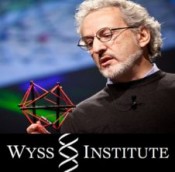Q&A: Don Ingber – Innovation Inspired by Nature
Written on June 18th, 2014 |
Aired 05/06/12
After 3.8 billion years of R&D on this planet, failures are fossils. What surrounds us in the natural world is what has succeeded and survived. So why not learn as much as we can from what works? Nature, imaginative by necessity, has already solved many of the problems we are grappling with. Animals, plants, and microbes are the consummate engineers. They have found what works, what is appropriate, and most important, what lasts here on Earth.
In January 2009, Harvard received the largest philanthropic gift in its history — $125M — to create the Wyss Institute for Biologically Inspired Engineering, and today’s guest is its founding director, DON INGBER. I find this whole notion of imitating nature one of the most exciting developments in human activity and something that gives me great hope.
The human body is an engineering marvel that maintains its balance while executing complicated movements, and senses and adapts to heat and cold. Every 20 seconds, it circulates blood through its extremities. Its cells are able to replace wounded tissue, find and destroy dangerous invaders, and interconnect to produce thoughts and emotions. Our bodies – and all living systems – accomplish tasks far more sophisticated and dynamic than any entity yet designed by humans. By emulating nature’s principles for self-organizing and self-regulating, Wyss researchers develop innovative engineering solutions for healthcare, energy, architecture, robotics, and manufacturing.
Q&A: CAMERON SINCLAIR
Written on February 10th, 2011 |
Aired 02/06/11
CAMERON SINCLAIR was trained as an architect at the University of Westminster and at the Bartlett School of Architecture, University College London. His postgraduate thesis focused on providing shelter to New York's homeless through sustainable, transitional housing. After his studies, he moved to New York where he worked as a designer and project architect.
In 1999 Cameron Sinclair and Kate Stohr founded Architecture for Humanity, a grassroots nonprofit organization that seeks architectural solutions to humanitarian crises. Sinclair and Stohr compiled a bestselling book Design Like You Give A Damn: Architectural Responses to Humanitarian Crises.
Sinclair is a TED prize recipient, a Young Global Leader of the World Economic Forum, and serves on advisory boards of the Acumen Fund, the Institute for State Effectiveness and the Ontario College of Art and Design. As a result of the 2006 TED Prize, Architecture for Humanity launched the Open Architecture Network, the world's first open source community dedicated to improving living conditions through innovative and sustainable design. Every two years this network hosts a global challenge to tackle a systemic issue within the built environment.
